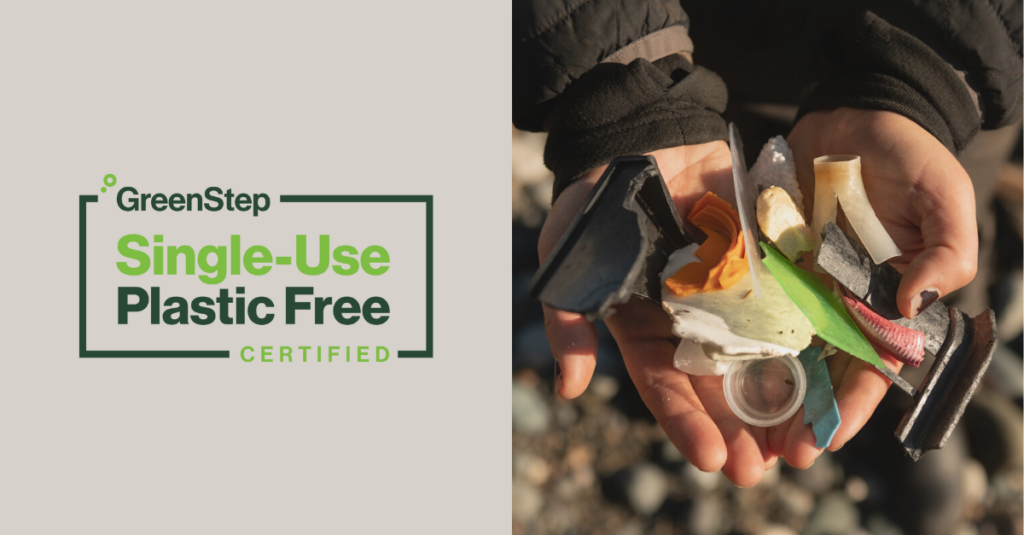New Sustainability Program to Benefit Canadian Tourism and Hospitality Sector
[August 30th, 2022 – Kelowna, Canada] GreenStep Solutions Inc., a leader in helping small to medium-sized enterprises measure and improve their sustainability performance, has announced their new Single-Use Plastic Free Certification.
“We are thrilled to be supporting hotels and tourism businesses to measure, reduce, and eliminate their single-use plastic consumption,” says Angela Nagy, CEO of GreenStep. “Recently, we had the pleasure of working with Fairmont Pacific Rim, which has become the first Single-Use Plastic Free Certified hotel in North America. As a luxury brand known for providing a world-class guest experience, Fairmont Pacific Rim has demonstrated that it is possible to achieve this aim while treading more lightly on the planet,” says Nagy.
Single-use plastic items are typically used only once before they are thrown away but take hundreds of years to break down. According to the Nature Conservancy of Canada, an estimated 3.3 million tonnes per year of plastic waste is produced in Canada, but only nine percent is returned for recycling. In addition, many disposable plastics, such as straws, bags, coffee sticks, food packaging, and water bottles, never completely break down, becoming microplastics. This results in billions of plastic items ending up in our lands, oceans, and rivers, which devastates wildlife and ecosystems.
GreenStep’s Single-Use Plastic Free Assessment and Certification programs help tourism and hospitality businesses to reduce and eliminate direct, indirect, and other plastics from their operations or replace them with more sustainable or environmentally-friendly alternatives. This is unique as the criteria go beyond the categories in the new federal ban as introduced by Justin Trudeau in June and include all non-essential single-use plastics, ranging from shampoo bottles to umbrella covers.
For a business to meet the certification requirements, it must undergo a thorough onsite assessment and meet the following criteria:
- No direct single-use plastics (except for essential single-use plastics)
- No new single-use plastic may be procured after the assessment
- Mandatory indirect single-use plastic recycling and waste management
- Reduction of indirect single-use plastic and non-single-use plastics over time
As Canada’s tourism sector pursues advancing social, cultural, environmental, and economic sustainability, the hotel industry continues to lead the way. “The opportunity and responsibility to lead the country in environmental sustainability for our industry is a key driver for the BC Hotel Association,” says Ingrid Jarrett, President & CEO of the BC Hotel Association, which represents over 80,000 rooms, 60,000 employees, and contributed over 3.2 billion dollars to the provincial economy in 2019.
“Through our GoGreen program, we have been providing hotels with programs to support provincial and federal climate action goals, in partnership with organizations like GreenStep,” explains Jarrett. “Preventing plastic pollution and supporting the move to a circular economy is another step along the path. Hotels will need solutions such as GreenStep’s Single-Use Plastic Free program to help them identify, limit, and eliminate their single-use plastic use over the coming years as part of the new federal regulations. We hold a global responsibility to do our best; this is an example of leadership and making a real difference.”
About GreenStep
GreenStep was founded in 2008 to help small to medium-sized enterprises measure and improve their sustainability performance. The organization has worked with over 3000 businesses and organizations of all sizes in various industries such as tourism and hospitality, retail, professional services, and manufacturing. For more information, visit www.greenstep.ca. In addition, GreenStep provides assessments, training, strategy, and certifications to tourism businesses and destinations through the Sustainable Tourism Division.

